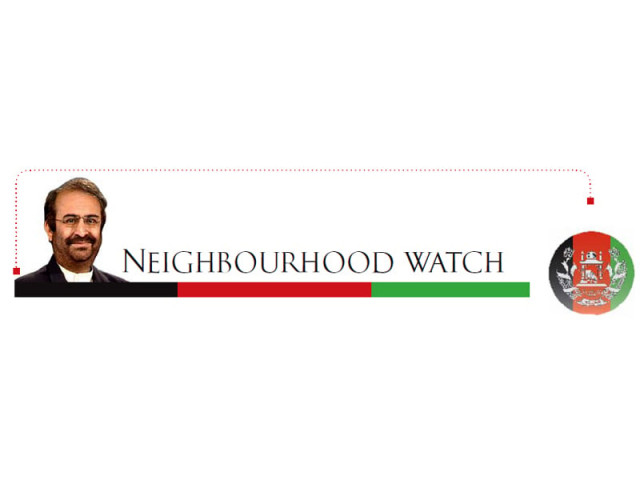Afghan parties gear up for 2014 presidential elections
The incumbent president’s opponents suggest they will form a coalition and field a candidate out of consensus.

Election fervour is gaining momentum in Afghanistan with its third presidential elections just eight months away. Political parties have intensified their search for suitable candidates and some have started nominating them to get a head start for campaigning.
Some prominent political personalities will also formally announce their candidacy in the coming days. According to the country’s Independent Election Commission (IEC), presidential hopefuls are required to register their nominations between September 16 and October 6.
Forming coalitions and alliances have also picked up pace, but no one as yet has officially introduced their nominees.
Incumbent Afghan President Hamid Karzai can no longer seek a third term in office due to restrictions placed by the country’s constitution. Observers strongly believe, however, that Karzai will support a trusted ally for a bid at the presidency. The president’s opponents suggest they will form a coalition and field a candidate out of consensus.
Nation Front of Afghanistan (NFA) Chairman Ahmad Zia Massoud claimed parties, including the National Coalition of Afghanistan (NCA), Jamiat-e-Islami, the Islamic United Party of Afghanistan, and the National Islamic Movement of Afghanistan are forming a new coalition. The new coalition will be announced at a large gathering in Kabul that would show senior leaders united on a single platform.
Senior opposition leaders also met in Munich, Germany last week to discuss an election strategy. It was attended by Massoud along with NFA member Mohammad Mohaqqeq among other Afghan leaders from Iran, Pakistan, Turkey and the United Kingdom.
The meeting Munich, which was criticised by the Afghan government, also discussed the parliamentary system, decentralisation of government, the ongoing peace process, security situation and the electoral process in Afghanistan.
NFA spokesperson Sardar Mohammad Rahimi said the meeting in Munich also discussed the presidential elections and potential candidates.
Though no names have been formally announced, Umer Daudzai, an ethnic Pukhtun, and the current Afghan ambassador to Pakistan, is one of the possible contenders. He is expected to resign from his position following President Karzai’s visit to Islamabad next week. Mohammad Sangar Amirzada, Daudzai’s coordinator, told an Afghan TV channel this week that tribal elders, young people and women activists came to his office and requested Daudzai to contest the presidential elections.
“So far we have not made a former decision and we are discussing this issue. Daudzai will definitely be nominated for the election if our programmes are accepted by the people,” he said.
Islamic Dawah Organisation of Afghanistan chief Abdul Rasool Sayyaf is another possible candidate. Sayyaf, a former Mujahideen commander who fought against the Soviets during the 1980s, recently claimed President Karzai had asked political leaders in a meeting to support him for the presidency.
Presidential spokesperson Aimal Faizi, however, instantly rebutted Sayyaf’s claims and said the president has not announced support for any candidate and will not interfere in the election process.
Former foreign minister and NCA leader, Dr Abdullah Abdullah, who is part Pukhtun and part Tajik, could be another possible presidential hopeful. He was the runner-up in the 2009 presidential elections against President Karzai.
Media reports suggest the NCA has agreed to field Abdullah as its candidate, but no official announcement has been made. Rumours had earlier gripped the country that the president would vouch for his elder brother, Quayum Karzai, for the job. The media, however, is somewhat silent on the issue while an Afghan diplomat claimed the president will never go ahead with this as “he does not want to set a precedent for family politics.”
Another section of the media reported Karzai scratched the idea amid strong domestic and international pressure. Even close presidential aides are unwilling to see another Karzai rule the country beyond 2014.
Human rights concern
Human rights groups in the country are concerned human rights violators might contest the presidential elections. The IEC has voiced a similar concern, but contended those accused for rights violation who have not been convicted cannot be prevented from contesting elections.
IEC spokesperson Nur Mohammad Nur said individuals with a bad track record will be among those taking part in the presidential and provincial council elections “and we are concerned about this.”
The Independent Human Rights Commission of Afghanistan (HRCA) also expressed similar concerns. “Filing documents about crimes, war crimes and crimes against humanity could help the government fulfil its commitment to justice,” said HRCA spokesperson Dr Rafiollah Bedar.
Published in The Express Tribune, August 24th, 2013.



















COMMENTS
Comments are moderated and generally will be posted if they are on-topic and not abusive.
For more information, please see our Comments FAQ